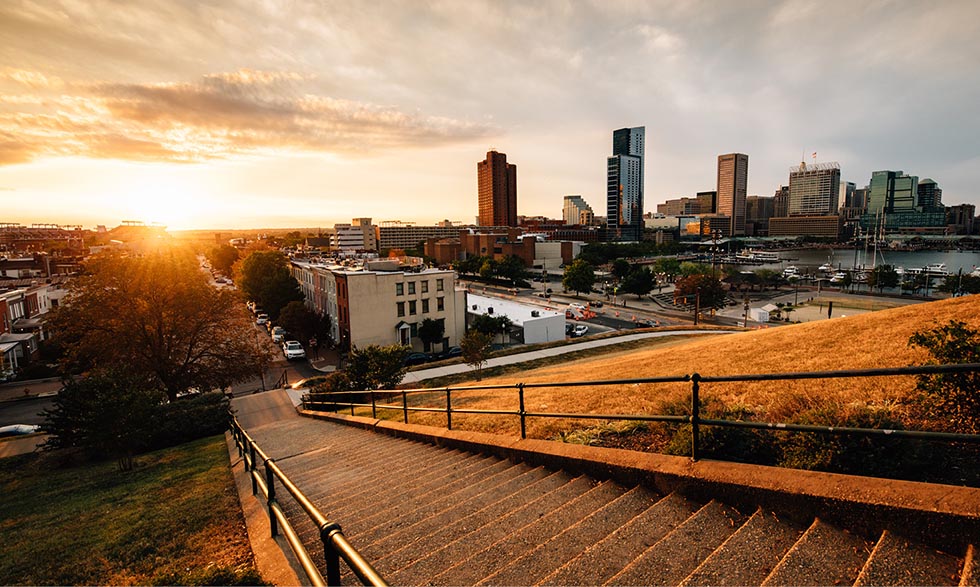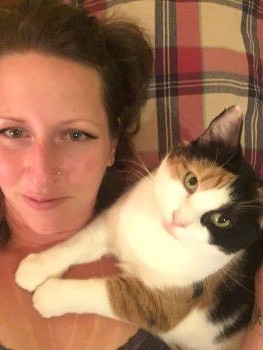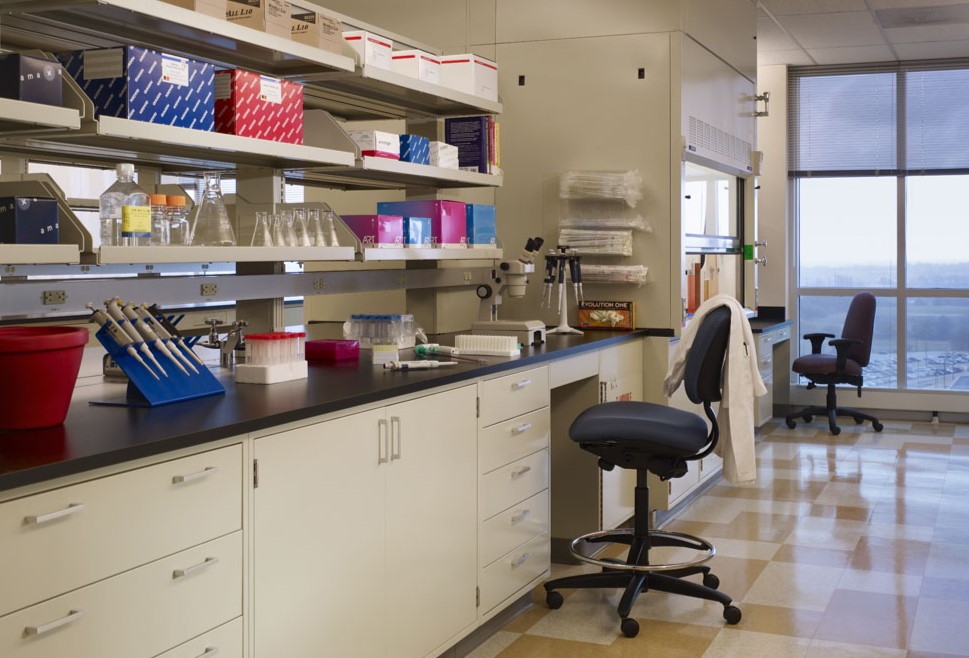
Last updated on October 18th, 2024 at 01:33 pm
Rachel George is in recovery for opioid use disorder (OUD). Now she’s sharing her story with NIH MedlinePlus Magazine to let others with OUD know they are not alone and there are people who want to support them. A participant in OUD-related clinical trials at the National Institute on Drug Abuse (NIDA) in Baltimore, Maryland, Rachel hopes her experience can help researchers study treatments and better understand addiction.
Why did you start taking opioids? What did you know about how they might affect you?
I started using opioids in 1997, when I was 15. I used to smoke a lot of weed and take LSD frequently until I experienced a “bad trip” and ended up in an intensive outpatient program. I stopped smoking weed because they gave me urine tests and instead sought out drugs such as ecstasy and heroin (an opioid) that would get out of my system faster.
The only information I had about opioids at that time was from one of my favorite movies. But it did not exactly glamorize the lifestyle. Once I felt the effects of opioids, I had no reason or motivation to stop using them until the legal issues, and later the addiction issues, started.

Rachel George, pictured here with her late cat McAdoo, has participated in clinical trials for OUD at NIDA. She dedicates her story to McAdoo.
When did you first think you might have OUD?
I have only recently learnt the term “opioid use disorder.” As soon as I heard it, I was relieved to have an identity word that wasn’t “junkie” regarding my addiction. I didn’t know I had a problem with opioids until my 20s when I started doing extreme things to get money to get high. It was also around that time when I started experiencing withdrawal symptoms.
By then, I had used opioids for about seven years. The withdrawals were not too bad at first—I could sleep through them with the aid of prescription drugs I got from my neighbor—but it turned into a beast I could not ignore. I was in jail when I experienced the worst withdrawal I had ever felt. At home, I had the opportunity to go make money and use. In jail, there was no option. That experience taught me withdrawal has a very heavy mental and psychological side to it.
Once at a high school party, I decided to whip out my works and shoot up in front of everyone there. I’m pretty sure people there thought I had a problem. My friends knew when I stopped hanging out with them. And my family knew when I told them I was stealing from them and I had been arrested for robbery.
What is it like for you to live with OUD? What are the effects on your health and well-being?
Living with OUD is like being on a rollercoaster. I have built my life up four or five times just to have it pawned away from a few months of using. I’ve been fortunate enough to be able to keep climbing out of the holes I dug—some deeper than others. But one thing I have realized is it gets harder to pick myself back up each time.
I haven’t had any serious long-term physical effects from my OUD aside from intravenous scars and deteriorating teeth. Mentally, I’ve learnt I will need to make amends for the things I’ve done during my active addiction, especially to myself. If I don’t take care of that, my mind will surely sabotage everything I try to do in recovery. It takes a lot of mental strength to get clean. I’ve had to deal with legal issues (I am now no longer on probation!) and attempt to find work without lying about myself, all while trying to acclimate back into society.
When did you consider getting help for OUD? Who did you first talk to about it?
Once I talked about my OUD to someone else, I had to do something about it, such as ask myself, “Do I want to use or not?” Naturally, as an addict, my answer will always be that I want to. It takes strength and work to say no, and until then, that was the opposite of what I had been doing.
When I first realized I had a problem, I went to my mom. We are very close, and she is very “tough love,” so I thought she could fix me. But no one but me can fix me, and it was very unfair to put that expectation on her. I let her know how I was feeling every day, and I told her every time I used. We could not figure out why I continued to use opioids even though I didn’t want to anymore.
I have always been an “I can do anything” kind of person. I bought a house when I was 22. I have three college degrees. I got my insurance to pay for an elective plastic surgery procedure. I thank my parents for putting that kind of belief in myself.
So we were all baffled when in 2013, when I was 33, I shot up behind the wheel and overdosed. The car veered off the highway, thankfully not hitting anybody. I literally thank God to this day for that miracle. When I regained consciousness, a cop was knocking on my window, and there were so many people surrounding my car and giving their witness statements. I heard someone say as they took me away, “She’s on drugs? But she’s so pretty!” Drugs do not discriminate. They take the pretty. They take the ugly. Rich, poor, old, young. No one is immune from this.
I ended up in rehab where I told counselors I was done—I did not want to live like that anymore. I was on methadone to treat OUD at the time, and they detoxed me off of everything. I came out of there clean. For almost seven years, I was in 12-step recovery.
Why did you decide to seek treatment for OUD?
After those seven years, I started using fentanyl [a powerful synthetic opioid] because heroin was replaced on the streets with fentanyl. I realized the withdrawal from fentanyl was significantly worse than when I was using heroin. I knew things would get worse, so I got into a clinic before it got too bad. I also decided to stop using because the drug supply was not consistent. The quality and effects were less predictable than before. One time I felt like I was breathing gasoline for a week! The experience of using changed, and I did not like it anymore.
Why did you decide to participate in NIH clinical trials?
Back in the late 1990s, I used to drive to Baltimore to get high, and I’d see ads in the back of the newspaper for drug trials. It sounded pretty cool back then, but I had other ways of getting money.* When I decided to find ways to make honest money, I remembered these ads and found NIDA. I knew it was the right fit for me after the first trial.
What was your experience in the clinical trials? How has your life changed since?
I was looking forward to the studies when I first went in, but I was not expecting to be treated with such kindness and respect by the friendliest professionals I had ever met. I am not shy about my OUD, so I have experience with a wide range of attitudes toward addicts. NIDA has people who know how to make an addict feel welcomed and respected. The trials were fun and interesting, there were no surprises, and everything was discussed up front. I was happy to be a part of modern addiction science—and to be paid for it!
I qualified for multiple studies, including a twenty-one-day inpatient study where I went through several days of moderate withdrawal from methadone. Everybody involved, from the head doctors to the interns, were so nice and worked hard to make me feel as comfortable as possible. I met some people I got really close to, and they would check on me in the housing unit where I stayed during the clinical trial because it was an inpatient study. The studies allow me to feel like I am contributing to making the world better for people with OUD. There aren’t many good things to come out of my addiction, but this is definitely the best.
Since the studies, I’ve become involved in productive activities, including this article. I am a member of a NIDA Community Advisory Board that makes decisions regarding clinical studies. I’ve also shared my story at a NIDA conference. I really am grateful for all the opportunities that came out of the studies I participated in.

NIDA’s Intramural Research Program operates clinical trials for a range of substance use disorders and treatments.
How would you describe your physical and mental health today?
My physical health today is pretty good. My mental health, on the other hand, is not so good. I’m not sure whether it’s from the OUD or from some realizations I recently made. I’m going through some anxiety due to post-traumatic stress disorder. I am on a high dose of methadone and, compared to being off opioids completely, I think it makes me mentally cloudy and anxious. On a positive note, the methadone has made it much easier to manage my OUD—I am very grateful it was available when I needed it.
I also see a counselor twice a month. I get along well with her, and we laugh a lot. I’ve found it extremely helpful to have her so I can get everything off my chest, and she provides very helpful feedback.
I am in new territory when it comes to how I am dealing with life. I am struggling. It would be easy to fall back into using every day to avoid what I am dealing with, but I choose to climb instead of fall.
What would you say to someone else with OUD who may be struggling or considering treatment?
What I would say is: You are not alone. And make sure you are not alone when you are using! Especially with the uncertainty of the drugs out there, some small adjustments in the way you use could mean the difference between life and death.
If you are considering treatment, my best advice is to try it! What else do you have to do today? Also, don’t be so hard on yourself. You can change things, but give yourself the time and space to recover and heal.
It’s a very cool process to come out of active addiction and see what kind of person you have been holding back with drugs. I have amazed myself more than once with the things I achieved in recovery. No matter what you have done in your addiction, you are not only salvageable, but you are a strong, beautiful individual. Never give up. Keep coming back.
What advice would you give to anyone who wants to support someone with OUD?
I would say get some help yourself, especially if you are really close to the person. You are also not alone. I’ve learnt through 12-step programs that the people supporting the addicts need support themselves. There are even support groups for loved ones.
There isn’t only one way to help someone with OUD. If you need to love someone from far away for your own health, do it. Some people in my life cut me off while I was using, and it later turned into motivation to stay clean. Others did things that might be called “enabling,” but they provided the only love I felt when I was all alone using. And that got me through to another day.
If your person with OUD is using, notice how helping them makes you feel. If you feel guilty or hurtful, seek help. If your person is seeking recovery or in recovery, do everything you can to help. But again, pay attention to how it is affecting you.
Is there anything else you want our readers to know?
We have come a long way in understanding addiction, and I am so lucky to be able to witness the positive changes in society. I think participating in these studies and the other work I am doing is helping these changes along. I am so grateful to have the opportunity to turn such a devastating part of my life into something wonderful. I thank everyone who has allowed me to help and, of course, my family for always being there no matter what I have done to hurt them. Thank you for allowing me to make amends. I dedicate this story to my late cat, McAdoo (2010–2024).
*Editor’s note: NIH research trials may offer compensation to participants.
